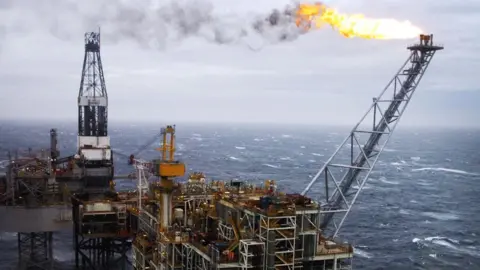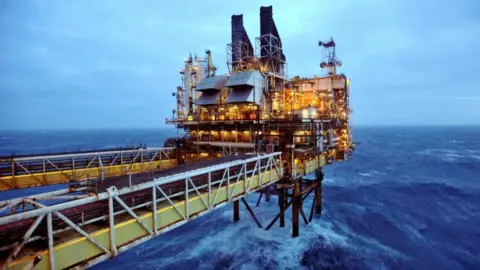Oil and gas climate test branded a sham by environmentalists
 PA
PAA slimmed-down climate compatibility checkpoint for new oil and gas development has been branded a sham by environmentalists.
The UK government has published details of the test which allows the go-ahead for a new round of exploration licensing in the North Sea.
It will compare greenhouse gas emissions in the UK sector with others.
The industry is understood to be pleased with the test but Greenpeace said it was considering legal action.
The test has no predetermined threshold for whether an application passes or fails.
The checkpoint was announced in March last year following a review into whether continuing to licence for oil and gas exploration was compatible with the UK's climate objectives.
Ministers had been coming under pressure for continuing to support new oil field development while acting as hosts of the UN's COP26 climate change summit in Glasgow.
The proposals had included a test on the "global production gap" where the sum of all countries forecast oil and gas development exceeds the agreement to limit temperature rises to between 1.5 and 2 degrees Celsius.
That test has been scrapped with the government citing the "improbability of global co-operation on pro-active production cuts".
 Reuters
ReutersIn August last year, Scotland's first minister, Nicola Sturgeon, said the original proposals did not go far enough and should also be applied to new developments in already-licensed oil fields.
This announcement is part of a package of measures from the UK government which include lifting a moratorium on fracking.
The SNP's energy spokesman Stephen Flynn described the move as "bonkers" and said there would be "no fracking whatsoever" in Scotland.
The Scottish government has used planning laws to ban fracking in Scotland since 2015.
Business and Energy Secretary Jacob Rees-Mogg said: "In light of Putin's illegal invasion of Ukraine and weaponization of energy, strengthening our energy security is an absolute priority, and - as the prime minister said - we are going to ensure the UK is a net energy exporter by 2040.
"To get there we will need to explore all avenues available to us through solar, wind, oil and gas production - so it's right that we've lifted the pause to realise any potential sources of domestic gas."
'Worthless charade'
The North Sea Transition Authority, which regulates the sector, said it would launch the next round of licensing from October.
It is more than two years since the last round, which is usually carried out annually.
More than 100 licences are expected to be issued with a focus on expanding existing infrastructure rather than exploring for new oilfields.
Greenpeace said it was a sham climate checkpoint voted on by oil and gas companies.
And Freya Aitchison, from Friends of the Earth Scotland, said: "In ploughing forward with this new licensing round, the UK government is effectively denying the reality of the climate emergency with scientists and energy experts clear that there can be no new oil and gas.
"The UK government's supposed checkpoint is a worthless charade as there can be no climate compatible new oil and gas. It is a deeply cynical attempt to provide cover for reckless plans to expand the very industry that is fuelling both the climate and the cost-of-living crises."
The three tests which form the climate compatibility checkpoint will cover:
- Reductions in operational greenhouse gas emissions from the sector vs. commitments
- Reductions in operational greenhouse gas emissions from the sector benchmarked internationally
- Status of the UK as a net importer or exporter of oil and gas
The proposed tests which have been abolished focused on:
- Sector progress in supporting Energy Transition technologies
- Consideration of international Scope 3 emissions (from consumers burning the oil and gas which is produced)
- Consideration of the "global production gap".
Speaking ahead of the announcement, Mike Theolen from Offshore Energies UK (OEUK) said: "We need new licences now because the UK continental shelf is what we call a mature basin where many existing fields are in gentle decline.
"That means we rely on finding new oil and gas resources simply to maintain production at current levels. We need new exploration and production licences so that we can find those reserves.
"Delays in issuing licences could lead to reduced gas and oil production - and that would damage our energy security."
